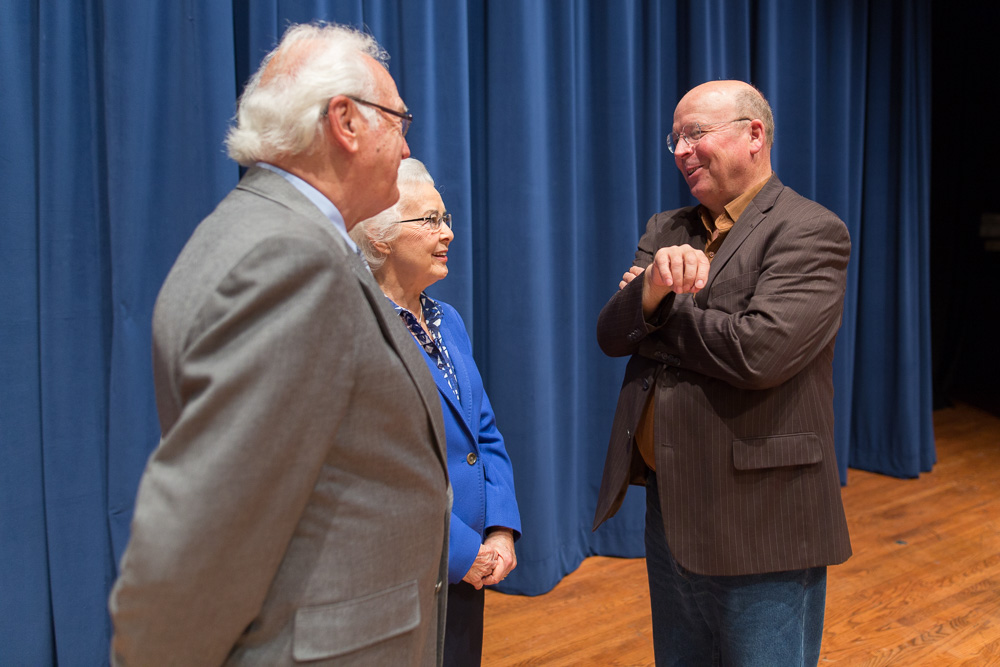In a violent world in which strident cruelty to others is often publicized and rewarded, The Reverend Canon Dr. Scot McKnight urged audience members at Eastern Mennonite University (EMU) to take seriously “The Jesus Creed.”
Even when confronting hurtful personal attacks, as he did four years ago with a critic of his writings, McKnight says the hard road, the “sacrament of grace,” is the one that Jesus laid out: “‘Love the Lord your God with all your heart and with all your soul and with all your mind.’ This is the first and greatest commandment. And the second is like it: ‘Love your neighbor as yourself.’ All the Law and the Prophets hang on these two commandments.” (Matthew 22: 36-40)

“The only way to undo a cycle of violence and disagreement and division in this world is not to ramp up the division by striking back but to end cycles of ungrace with cycles of grace,” he said. “I’m not going to tell you that I do this all the time and that it always works … The challenge that Jesus gives to you and me is to turn our enemies into neighbors by loving them and praying for them.”
McKnight’s message of ministry and outreach was shared at EMU chapel, seminary chapel and in an evening presentation as part of the annual Augsburger Lecture Series, funded by President Emeritus Myron Augsburger and his wife, Esther. The lectureship brings a noted lecturer to campus “to address pertinent topics on the area of Christian evangelism and mission for the stimulation and development of a vision for evangelism and missions for the students, faculty and staff of EMU.”
Read 2015 Augsburger Lecture Series coverage of Eastern Mennonite Missions President Nelson Okanya.
McKnight, an ordained Anglican, is an American New Testament scholar, historian of early Christianity, theologian, author and blogger (visit “Jesus Creed,” housed under the evangelical channel of Patheos.com). With more than 50 books in print, he has written widely on the historical Jesus, early Christianity, the emerging church and missional church movements, spiritual formation and issues in modern Anabaptism. He is the Julius R. Mantey Professor of New Testament at Northern Seminary in Illinois.
The lecture series correlated with Mission and Service Day, a fair-type event in which agencies and organizations come to EMU to recruit the campus community to a variety of service work. Among those represented were Wycliffe Bible Translators, Eastern Mennonite Missions, Mennonite Mission Network, PULSE (Pittsburgh Urban Leadership Service Experience), Bridge of Hope Harrisonburg-Rockingham, Mennonite Central Committee Sharing with Appalachian People (SWAP), Y-Serve and Virginia Mennonite Missions.

McKnight’s message to the seminary community on Thursday evoked the power of the story of Jesus, referencing Acts and Peter’s retelling. All Christians can do, he said, is do the same.
“I have renewed confidence in the power of Jesus to attract people to himself,” McKnight told the seminary community, before sharing about Hindus and Muslims in his classes who were attracted to Jesus, even if they resisted initially.
“We need to be reminded that God loves all people and is at work in all people, even if we don’t know it,” McKnight said. “Jesus went around doing good, doing acts of benevolence in the public sector. He had a willingness to see good in people that no one else could see.”
“And he was crucified unjustly.” McKnight continued. “The injustice of the death of Jesus is a theme that can be recaptured in churches today. As well as the idea that God reversed that injustice. Hope overwhelms depression and gloom. Death does not have the final word.”
“As Christians we only have Jesus to offer the world, not our goodness or our music or our culture or our acts of service. Jesus is the story we have to tell.”
“The way of the kingdom is the way of telling the story of Jesus, being verbal witnesses to Jesus. We should not be so overly sensitive that our verbal witness is undone.”
